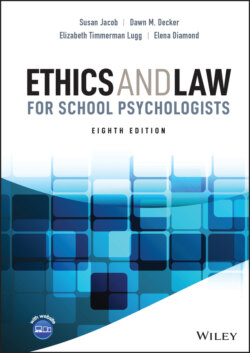Читать книгу Ethics and Law for School Psychologists - Susan Jacob - Страница 84
Federal Antidiscrimination Legislation
ОглавлениеCongress also has passed antidiscrimination or civil rights legislation that has had an impact on public school policies and practices. These statutes prohibit state and school authorities from discriminating against individuals on the basis of race, color, or national origin3 ; sex;4 or disability5 in any program or activity receiving any federal funding. A state department of education (SDE) may choose not to pursue monies available under federal grant statutes (e.g., funds for infants and toddlers with disabilities). School districts must comply with antidiscrimination legislation if they receive any federal funds for any purpose, however.
Federal antidiscrimination laws also protect students from harassment based on race, color, national origin, sex, or disability. The term harassment means oral, written, graphic, or physical conduct relating to an individual’s race, color, national origin, sex, or disability that is sufficiently severe, pervasive, or persistent so as to interfere with or limit the ability of an individual to participate in or benefit from the district’s programs or activities (see U.S. Department of Education & Bias Crimes Task Force of the National Association of Attorneys General, 1999). Sexual harassment means unwanted and unwelcome sexual advances that are sufficiently severe, pervasive, or persistent so as to interfere with or limit the ability of an individual to participate in or benefit from the district’s programs or activities. The federal laws cited make schools responsible for taking reasonable steps to remedy harassment.
The U.S. DOE Office for Civil Rights (OCR) provides guidance regarding the interpretation and implementation of antidiscrimination law in the schools and conducts investigations of schools after receiving a discrimination complaint. If evidence of discrimination is found, the OCR may order a school district to engage in remedial actions to correct the discrimination. If voluntary compliance cannot be achieved through informal actions, the OCR may take steps to suspend federal funding to the school.
Federal statutory law does not explicitly prohibit discrimination in the public schools based on religion or sexual orientation, gender identity, or gender expression. However, in 2010, the OCR extended its protections to include discrimination and harassment based on a student’s religion. In addition, the OCR made known that, as part of national efforts to reduce bullying in schools and to ensure equal educational opportunity for all students, it explicitly interpreted Title IX as prohibiting harassment and bullying based on sexual orientation or nonconformity to gender role stereotypes. Furthermore, if harassment based on sexual orientation or nonconformity to gender-role stereotypes resulted in a hostile learning environment for a student, schools “have an obligation to take immediate and effective action to eliminate the hostile environment” (Ali, 2010, p. 8).
In 2016, the U.S. Department of Justice and DOE restated their Title IX obligations to LGBTQ+6 and clarified that schools should treat transgender students consistent with their gender identity (Lhamon & Gupta, 2016, May 13). The 2016 document was rescinded during the Trump administration. Guidance issued in 2017 stated that transgender students will continue to have protections from discrimination and harassment, but that they will no longer have a right under Title IX to access to public facilities (e.g., restrooms and locker rooms) based on their gender identity rather than their assigned sex at birth (Battle & Wheeler, 2017). In 2021, citing the Bostock v. Clayton County (2020) Supreme Court decision, U.S. DOE OCR issued an updated interpretation of Title IX, reaffirming that the law applies to discrimination based on gender identity as well as sexual orientation, with exceptions for schools controlled by religious organizations where compliance would not be consistent with religious tenets (Goldberg, 2021, June 16). As of June 2021, the issues of whether transgender students must be allowed to access public facilities or play school sports based on their gender identity rather than their sex assigned at birth had not been explicitly considered by the U.S. Supreme Court or DOE. (See Chapter 9.)
